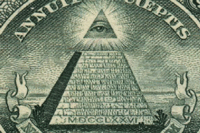
Building Wealth
Cat: ECO
Pub: 1999
#: 9909b
Lester C. Thurow
99531u/18219r
Title
BUILDING WEALTH
富のピラミッド
Sub
Title
The new rules for individuals, companies,
and nations in a knowledge-based economy.
知識主義経済における個人、企業、国家の新たな役割について
Author
Lester C. Thurow
レスター・C・サロー
Published
1999
1999年
Why
this
book?
- On
the back of the dollar bill there is an unfinished pyramid. It was
placed on the dollar bill by President Roosevelt in 1935, in the
middle of the Great Depression.
- The pyramid was meant to represent economic strength and durability.
It is unfinished to symbolize the possibilities of ever-increasing
American wealth.
- One Latin inscription (Annuit Coeptis) tells Americans
that God favors their undertakings.

- The other (Novus Ordo Seclorum) prophesies a new American
order of wealth.
- Thus in their darkest economic days, Americans were both invoking
man's oldest symbols of durable success.
- $1紙幣の裏側には、未完成のピラミッドの図柄がある。これは大恐慌の最中1935年、ルーズベルト大統領によって$1札に使われた。
- ピラミッドは経済力とその永続性を象徴している。また未完成のピラミッドは米国の富が増加を続けることを象徴している。
- 図柄の上下にあるラテン語は、
- "Annuit Coeptis"
"神は我々の企てに与し賜へり"
で神の恩寵を伝え、
- "Novus Ordo Seclorum"
"世紀の新秩序生まれる"
では富をもたらす新体制を宣言している。
- 米国国民は大恐慌の最も暗い時代に、永続的な成功を象徴する最古のシンボルを掲げたのだ。
Summary
要約
- <Rule 1> Disequilibrium:
- No one has eve become very rich by saving their money. The
rich see opportunities to work and invest in situations where
large disequilibrium exist.
- Eventually disequilibrium conditions always disappear.
- <Rule 2> Cannibalize the old:
- Successful businesses must be willing to cannibalize themselves
to same themselves. If they won't destroy themselves, others
will destroy them.
- <Rule 3> Take advantage of disequilibrium:
- Businesses that would grow rapidly with high profit margins
must take advantage of technological disequilibrium, exploit
developmental disequilibrium, or create sociological disequilibrium.
- <Rule 4> Understand genetic weaknesses:
- The secret of success is finding places to employ one's resources
where those weaknesses are irrelevant.
- <Rule 5> Take the inflation:
- Humans have not discovered how to operate successful capitalist
economies in the midst of even mild deflation. Given a choice
between the same rate of inflation or deflation, take the inflation
every time.
- <Rule 6> Entrepreneurs:
- There is no institutional substitutes for individual entrepreneurial
change agents. Without entrepreneurs, economies become poor
and weak. The old will not exit; the new cannot enter.
- <第1の法則> 不均衡状態:
- 金を貯めて大金持ちになった者はいない。大きな不均衡がある部分で事業展開や投資機会を見いだした者が大金持ちになる。
- 不均衡の状態はいずれ解消する。
- <第2の法則> 創造的破壊:
- 企業が成功を持続するためには、自社を破壊する意思をもたなければならない。自社をみずから破壊しなければ、他社に破壊されるだけである。
- <第3の法則> 不均衡の活用:
- 急成長し、高い利益率を上げるには、技術不均衡、開発の不均衡、社会的不均衡を利用すること。
- <第4の法則> 弱点への理解:
- 本来持っている欠点・限界が問題にならない分野で資源を活用する場を見つけること。
- <第5の法則> デフレ経済は不明:
- 資本主義経済下で、ゆるやかといえデフレ経済の運営方法はわかていない。率が同じであれば、デフレ経済よりむしろインフレ経済を選んだ方がいい。
- <第6の法則> 起業家の登場
- 個人起業家に代わって変化を担える機関はない。起業家がいなければ、経済は衰退していく。古いものが退場せず、新しいものが誕生しないからだ。
- <Rule 7> Right degree of order:
- Any society that values order above all else will not be creative,
but without the right degree of order, creativity disappears
as if into a black hole.
- <Rule 8> Intellectual proper rights:
- The economic payoff from more social investment in basic research
is as clear as anything is ever going to be in economics.....
Economic success depended upon the ownership of natural resources
and capital equipment. but intellectual property rights have
moved from the periphery to the center of economic success.
- <Rule 9> Clear ownership rights:
- Knowledge-based capitalism isn't going to work without a new
system for determining who owns or controls intellectual property
rights. Capitalism requires clear, easy-to-enforce ownership
rights.
- <Rule 10> How to have a career:
- The biggest unknown for the individual in a knowledge-based
economy is how to have a career in a system where there are
no carriers.
- <Rule 11> Interest in the future:
- Only those interested in the future build tools. Whatever
they might say, those who build few tools are not interested
in the future.
- <Rule 12> Environmental progress
- Economic and environmental progress are synonyms - not antonyms.
- <第7の法則> 適度な秩序:
- 秩序を何よりも重んじる社会は創造的ではあり得ない。しかし、適度な秩序がなければ、創造性はブラックホールに消える。
- <第8の法則> 知的所有権:
- 基礎研究の経済効果は、経済学のいかなる成果と比べても極めて高い。...
過去には経済的成功は転々資源や資本設備によって決まった。しかし知的所有権は、経済的成功を決める副次的な要因から、決定的な要因になった。
- <第9の法則> 知識主義経済:
- 誰が知的財産を所有し、管理するのかを決めなければ知識主義経済は機能しない。明快かつ執行容易な知的所有権が必要である。
- <第10の法則> キャリア構築:
- 知識主義経済の中で、個人が最もわからないことは、キャリアのない体制で、いかにキャリアを築くかである。
- <第11の法則> 未来への関心:
- 将来に関心を持つ者だけが、資本設備を建設する。設備をあまり建設しない者は、言い分はどうであれ、将来に関心がないと言える。
- <第12の法則> 環境保護:
- 経済成長と環境保護は同意語であって、対立語ではない。
<Epilogue>
- Humans have a sense of coming from somewhere
and going to somewhere. Their future is not determined by the stars.
It is under their control. They can make investments that create
a future different from what it otherwise would have been.
- Humans can leave their footprints in the
sands of time. Few will do this in the sense that their names are
remembered, but many can do it in the sense that they participate
in efforts that are remembered far into the future. Their part of
the journey was a step forward.
<エピローグ>
- 人間は、遠方から来て、遠方に行くという旅の感覚をもっている。人間の運命は星によって決められるのではなく、自らの手に委ねられている。投資をすることで、そうしなかった場合とは違う将来を作ることができる。
- 人間は時間という砂に足跡を残すことができる。個人の名が記憶されるような足跡を残せる人は希だが、大部分の人にとっては、遠い将来まで記憶される事業に参加することで足跡を残せる。人間の旅をそれぞれの部分において前進させることになるのだ。
Comment
- The author well describes the forecast of 21st century capitalism
using figurative speaking of "Wealth of Pyramid".
- 著者は、21世紀資本主義の展望を"富のピラミッド"の比喩で明快に解説している。
 |
Building Wealth
|
Cat: ECO
|
|
99531u/18219r |
Title |
BUILDING WEALTH |
富のピラミッド |
|---|---|---|
Sub |
The new rules for individuals, companies, and nations in a knowledge-based economy. |
|
Author |
|
|
Published |
|
|
Why |
|
|
Summary |
要約 |
|
|
|
|
<Epilogue>
|
<エピローグ>
|
Comment |
|
|
|---|